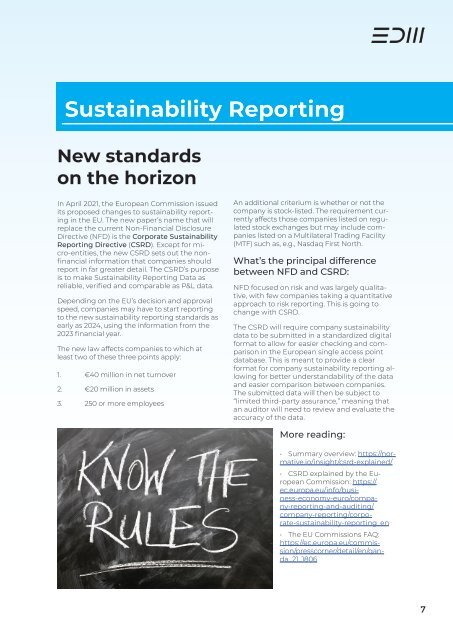EDM Sustainable Business 2022
EDM Business editions represents the board-level conversation in multichannel retail focussing commercial growth and connection with the digital, demanding consumer.
EDM Business editions represents the board-level conversation in multichannel retail focussing commercial growth and connection with the digital, demanding consumer.
Create successful ePaper yourself
Turn your PDF publications into a flip-book with our unique Google optimized e-Paper software.
Sustainability Reporting<br />
New standards<br />
on the horizon<br />
In April 2021, the European Commission issued<br />
its proposed changes to sustainability reporting<br />
in the EU. The new paper’s name that will<br />
replace the current Non-Financial Disclosure<br />
Directive (NFD) is the Corporate Sustainability<br />
Reporting Directive (CSRD). Except for micro-entities,<br />
the new CSRD sets out the nonfinancial<br />
information that companies should<br />
report in far greater detail. The CSRD’s purpose<br />
is to make Sustainability Reporting Data as<br />
reliable, verified and comparable as P&L data.<br />
Depending on the EU’s decision and approval<br />
speed, companies may have to start reporting<br />
to the new sustainability reporting standards as<br />
early as 2024, using the information from the<br />
2023 financial year.<br />
The new law affects companies to which at<br />
least two of these three points apply:<br />
1. €40 million in net turnover<br />
2. €20 million in assets<br />
3. 250 or more employees<br />
An additional criterium is whether or not the<br />
company is stock-listed. The requirement currently<br />
affects those companies listed on regulated<br />
stock exchanges but may include companies<br />
listed on a Multilateral Trading Facility<br />
(MTF) such as, e.g., Nasdaq First North.<br />
What’s the principal difference<br />
between NFD and CSRD:<br />
NFD focused on risk and was largely qualitative,<br />
with few companies taking a quantitative<br />
approach to risk reporting. This is going to<br />
change with CSRD.<br />
The CSRD will require company sustainability<br />
data to be submitted in a standardized digital<br />
format to allow for easier checking and comparison<br />
in the European single access point<br />
database. This is meant to provide a clear<br />
format for company sustainability reporting allowing<br />
for better understandability of the data<br />
and easier comparison between companies.<br />
The submitted data will then be subject to<br />
“limited third-party assurance,” meaning that<br />
an auditor will need to review and evaluate the<br />
accuracy of the data.<br />
More reading:<br />
• Summary overview: https://normative.io/insight/csrd-explained/<br />
• CSRD explained by the European<br />
Commission: https://<br />
ec.europa.eu/info/business-economy-euro/company-reporting-and-auditing/<br />
company-reporting/corporate-sustainability-reporting_en<br />
• The EU Commissions FAQ:<br />
https://ec.europa.eu/commission/presscorner/detail/en/qanda_21_1806<br />
7


